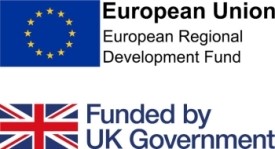Smart, Infrastructure and Mobility Urban Laboratory and Test Environment
SIMULATE
The ‘live lab’ SIMULATE (Smart, Infrastructure and Mobility Urban Laboratory and Test Environment) project at Keele University will develop, test and demonstrate how a smart highways network can be designed, maintained and extended to local roads.
A joint bid to the Association of Directors of Environment, Economy, Planning and Transport’s (ADEPT) for Government SMART Place Live Labs funding was one of seven successful ones from 28 submissions announced in 2019, receiving a funding allocation of £1.975million.
The project includes Staffordshire County Council, Keele University, county council highways partner Amey and industry specialists Connected Catapult, bringing in innovative SMEs to deliver the scheme.
Selected businesses will be delivering innovative solutions to combat challenges in sustainable mobility and air quality. They will trial new solutions with the aim of them being adopted onto the local and strategic road network.
Keele’s campus, which already has all the elements of a small town with roads, residences, leisure facilities and green spaces, will act as a ‘living laboratory’ to find new ways to keep people on the move in a more sustainable way.
The site includes around 3,100 residential students, 1,000 employees on the Science and Innovation Park, 200 ‘standard’ domestic households and academic activities serving 11,000 students.
Not only will innovative small businesses be involved at Keele and benefitting the wider economy, but students on site will also support the scheme as part of their studies. Successful new developments could then benefit communities across Staffordshire and the rest of the country.
The project will see a smart infrastructure network developed on the campus roads with a control centre set up to create the live lab. It will develop and test new technology to reduce congestion and road incidents, improve road user experience and improve both sustainable transport and air quality.
The Keele campus, which replicates a ‘small town’, already hosts Europe’s largest Smart Energy Network Demonstrator* – a research and development project to discover how new technologies can be used in the energy sector to improve efficiency, reduce carbon emissions and drive down costs.
Both schemes strengthen the New Keele Deal between the University, county council and other partners which started in 2016. It utilises the University’s academic and innovative strengths to improve the local economy, job creation and community health.
SIMULATE’s four mobility challenges are centred round tackling sustainable transport problems within a rural county. These are:
- Clean Community - connecting communities with quick and carbon neutral mobility options
- Dynamic Connections - providing a service that connects both urban and rural properties with critical amenities
- Rapid Transit – delivering a rapid point-to-point solution that takes into consideration volume of users at different times throughout the day
- Integration and Behavioural Change – seeking solutions to address the shift in attitudes and behaviours that is needed when moving from single use and private vehicles to a different mobility model
Running alongside these challenges, SIMULATE is also looking for solutions that can be deployed to tackle air pollution in areas with poor quality in Staffordshire, with three AQMAs selected as test environments for trialling new solutions.
Mark Ormerod, Keele University Deputy Vice-Chancellor and Provost, said: “Keele University is delighted to part of the Staffordshire SIMULATE project, which will make full use of both our academic expertise and our unique campus environment.
“The project will build on our existing ‘living laboratory’ projects, such as our landmark Smart Energy Network Demonstrator, which are transforming the UK’s largest single-site campus into the perfect location to develop, test and demonstrate the latest Smart and sustainable technologies.”
 Smart Energy Network Demonstrator
Smart Energy Network Demonstrator
The Smart Energy Network Demonstrator project (ref: 32R16P00706) is part-funded through the European Regional Development Fund (ERDF) as part of the England 2014 to 2020 European Structural and Investment Funds (ESIF) Growth Programme. It is also receiving funds from the Department for Business, Energy and Industrial Strategy (BEIS).





























